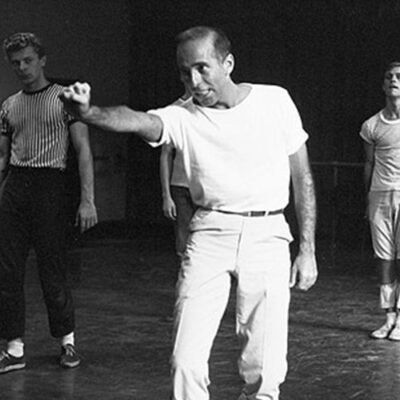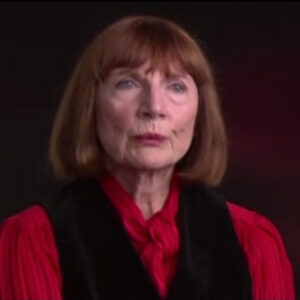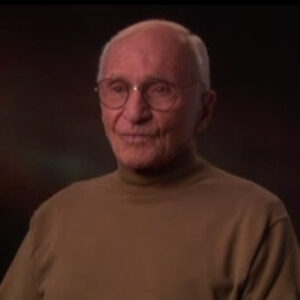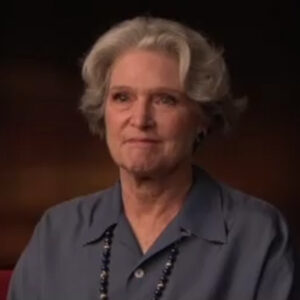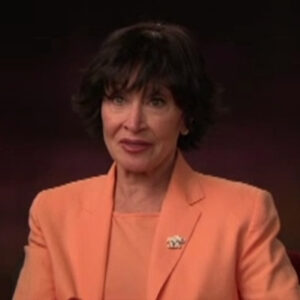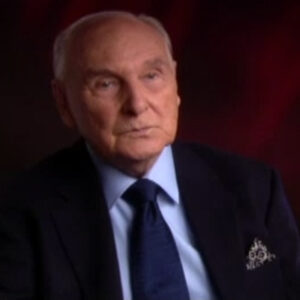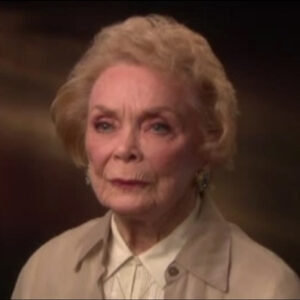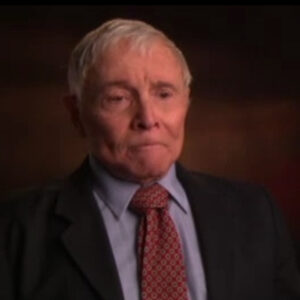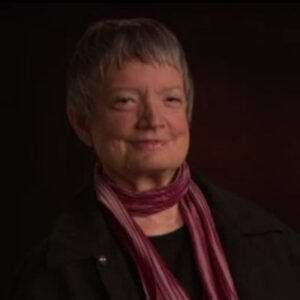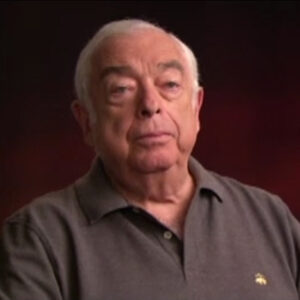Speaker If you were an aspiring ballet dancer in America in the 30s, what were your options?
Speaker Not too many. You could actually you could study, study, study. There were very few would, I think, good schools at the time in retrospect. But I was fortunate to be in Philadelphia where they had Catherine Middlefield in the Philadelphia company. And I studied with her and she was an excellent teacher.
Speaker OK, so you were saying there weren’t a lot of not not too many outlets, actually.
Speaker One thing good about the school in Philadelphia. She had us doing all kinds of things. We were in combination with the Philadelphia Grand Opera Company. So when we studied, I was eight years old and we were in Aida as a newbie and Slade was wonderful. And that gave me my really first thrill. And I decided this is what I wanted to do for the rest of my life.
Speaker I’m going to ask you to just put your glasses on right there.
Speaker Yeah.
Speaker Only because, you know, I’ll start hearing noise and then not know it.
Speaker So before we get to Jerry, could you talk to me a little bit about Tamiment just in general? You know, what was it like there in Tamina time?
Speaker I mean, it was marvelous. We had the most wonderful time because we were laid off from ballet theater and we didn’t have too much opportunity to go elsewhere. And so when we found the opportunity go to Tamiment, it was absolutely wonderful because we were able to experiment and dance and to have a lot of fun. What was it like physically was demanding? Because we were waiters and waitresses. We work for our money and we did, I think, oh, I forget four shows a week or something like that. But we got to meet the most wonderful people up there. All the new young comedians were there like Danny Kaye and Imogene Coca and Sid Caesar, and we had a blast.
Speaker Tell me about Coca. Jerry credited her with or she was born.
Speaker Coca was really wonderful. She was so inventive and so nice to work with. She was terrific. He did a ballet for her called Afternoon of a Fawn. And we were the nymphs in it. And she was the head nymph. And she was hysterical, absolutely hysterical.
Speaker She would drop it. Yeah. She was just just marvelous that that was the we had more fun there. It was just fun.
Speaker You know, what actually was Tamiment, if you could explain to me in a few sentences, a government is a camp for people to go up.
Speaker The summer it was in the Poconos and people would go up and spend time there and just have a good time. And they had entertainment for everyone and they would do riding and all the other things that you do at camps. But we were the entertainment and we we as I said, we served them food occasionally, too.
Speaker And it came out of a social movement.
Speaker Yes, it did. I think that Max Liebman was the one that started that. I think I believe I’m thinking of the randomness.
Speaker You know, I don’t know that now. OK, then, um.
Speaker Why don’t you tell me about Max, who was he and what was unique about him?
Speaker As a matter of fact, I don’t know too much about Max, except he encouraged all the young artists and he was absolutely a wonderful man.
Speaker I thought he gave us all the opportunity to come out, you know, and I mean, he sponsors all of us. Actually, it was wonderful.
Speaker What do you mean, his sponsor?
Speaker He made us come out of ourselves. You know, he gave us the job, you know, and keep us from starving to, um.
Speaker Where did you physically on the on the time and where did you perform and how elaborate were the production? Give me a sense of what that was like.
Speaker Well, it’s very difficult for me to remember. It’s been so long ago that how they performed and where we performed, there was a a stage and there was also a center thing that we performed into. And we rehearse like crazy. And we the stage was a regular stage, you know, they they had but it wasn’t that different from anything. It was modest, I should say.
Speaker When you say modest, um, little surprise, because from what I’ve read, the reviews were very elaborate orchestras and scenery.
Speaker And it was something that you would just go and say, you know, so can you tell me a little bit more about.
Speaker I’m afraid I don’t remember that much about the. Really. I’m sorry.
Speaker Um, do you remember any specifics about the reviews as they relate to Jerry that you could share with us?
Speaker Oh, they thought the reviews for Jerry were always good and surprising. He was very modest and always thought he was not doing too well, but he was doing marvelously and he always. Got good reviews, I would say encouraging ones.
Speaker Do you remember any specific numbers that he danced or you mean in the ballet later on in the.
Speaker No, we’ll get to that. Oh, about minutes. No, I don’t, I don’t I’m sorry, I don’t.
Speaker What about the dancers for Tamiment? Where did they come from? It wasn’t only the ballet, right? If you can tell me where the various dancers came from.
Speaker Well, the ones that I knew, the dancers that I knew came from mostly the ballet.
Speaker There was Maria Carnelian, Muriel Bentley and Don Sadler and David Nilo. You know those people? They’re the ones that I remember.
Speaker Um, what do you recall about Jerry as a dancer at Tamiment?
Speaker Well, he was just a more modern dancer than ballet dancer. I would say Jerry was never the dancer Noble. You know, he was he was always the American dancer. And that’s with his charm. And he never got to do the elegant roles he did mostly character roles, I would say.
Speaker And what was he doing was on duty? Yes, he did. OK.
Speaker Do you want us to cut specifically where you heard what the topic was?
Speaker The list of the people who would perform OK.
Speaker There was an earlier one.
Speaker Um.
Speaker Well, I’ll tell you what. Are you rolling? OK, Nerem, tell me about what you remember about Jerry’s dancing at Tamiment. What was he like as a dancer?
Speaker He was just a real regular guy, you know, he’s danced, he was not a client, as I said, he was not a classical dancer.
Speaker Knows we won’t have heard what you said.
Speaker Oh, OK. So let’s. Oh, OK.
Speaker He said before was terrific. I forgot what I said, but he was not. That’s right. OK, wait a minute.
Speaker And then OK, Jerry was a sort of American dancer. He was not your typical classical dancer. He never was a dancer. Noble.
Speaker He was free and easy. I would say that that’s where his technique was good, good technique. But he was not the regal, you know, dancer that they had.
Speaker So what kinds of things do you remember him dancing?
Speaker Well, way back at Tamam. I don’t remember those too much, but I do remember in ballet theatre.
Speaker OK, we’re going to get to know. I read somewhere that the company called him Mr. Happy. Do you remember that. No I don’t.
Speaker Um.
Speaker And you talked about how did we get that before, Peter, was that clean? I’ll ask you again. OK, tell me your whole name, OK? Yeah. Tell me about, uh, Kocot. Uh, what was it about her that Jerry just was crazy about her? Tell me.
Speaker Well, Imogene Coca was absolutely fantastic. She was so delightful to work with, so inventive and a marvelous sense of humor, of course. And I think I I Jerry did the ballet afternoon of a full on for her, and she was the nymph. And I think but I’m not sure Danny Kaye was the faun. And it was absolutely outrageously funny. And I was one of the nymphs in it. So I remember that. Well, she was hysterical. I mean, she just laid them in the aisles.
Speaker Um.
Speaker Do you I think you said you don’t remember his choreography there not to I don’t remember it now.
Speaker Um, well. You know, I was in musicals.
Speaker What was he like in at Tamiment? What was he like? Colleague?
Speaker He was very easy. We had so much fun. Jerry was very easy to be with. We had so much fun together and we would used to fool around a lot. And he was serious, though, on the other side, he’d do what he wanted to do. He was goal oriented, I would say, and but fun to be with. We never had a truck trouble because we were all so young.
Speaker Then Ruthanna told me he put a snake in her bed.
Speaker I wouldn’t doubt it, knowing the kind of experience you. Well, let me ask you this. What did you learn or what do you think Jerry might have learned from the Tamiment experience about putting on a show?
Speaker When Jerry choreographed, he knew somehow what was going to get the audience.
Speaker He just knew it. I think it was an innate ability. He knew what would be funny, what would be said, and he knew how to handle his dancers.
Speaker And do you does any of that go back to his Tamiment experience, um, do you think?
Speaker Oh, of course, of course he and that’s where he said, what should I say? Where feet of choreography. I think he he just knew what was good for for that particular audience at the time.
Speaker Now, um, ballet, you said that you had gone to ballet theatre last night. Ballet Theatre today is very, very different than it was when you were in the company in many ways.
Speaker Can you sort of paint a picture for us of what it was like to be in ballet theatre when you were there?
Speaker Being in ballet theatre was absolutely sensational, I couldn’t even say it now. Many, many, many years later, we were all striving to be somebody and we were all working with choreographers from all over the world, different styles, different ballets, different techniques. We did Spanish dancing. We did classical ballet. We did modern ballet. We did them all. We did I don’t know whether, you know, we did Anthony Tudors dark elegies. I was in that. And that was sort of on the modern side at that particular time. And we did Bluebeard, which was Anton Dolan’s ballet, which was sort of funny. And and then we did a selfie, which was classical. We did Swan Lake, which was classical. And it’s a gala performance, which was another elegant ballet. And it was just fun to work with all these marvelous, marvelous choreographers. And they all of us just were we just that’s we were going and we wanted to do that. That was our thing, you know, and we suffered a lot together, too. We used to go to harder and harder some 57 st and dilute the tomato juice so we would have dinner because our salaries were very hot, were very high. There were like 35 dollars a week or something like that. That’s for that for a soloist. And we used to play the Army game when we toured, you know, with the Army game is well, that’s an old saying. When you go on tour, you you take the mattresses off the bed to mattresses off the bed to sleep here, to sleep there, to sleep on the box, spring into the aid of one, would check in, but the rest of us would go and we and it was just great. It was just great. And touring during the war was was something we slept on sidewalks. We did all kinds of things. I have a picture of mark of it like this on a suitcase. Yeah. And somewhere down in the south when we toured, it was just but we loved it. We had such a good time.
Speaker Tell me a little bit more about touring in war time.
Speaker What’s that like on the trains example?
Speaker Well, we never we would never train. We come up and then the army would take over our trains and we’d have to sit down in the station and lie down like and wait for the next train. And it was but we were we were so lovely, happy go lucky kids, you know, that it didn’t matter to us. When you’re young, I think you can take a lot. And we always gave up our trains to the soldiers.
Speaker It was the spirit in the company at that time. Great.
Speaker Well, yeah, the spirit we were we all cared about each other, you know, and we were all so excited to be doing what we were doing.
Speaker And when we received applause, it was like manna from heaven was great.
Speaker We’re going to wait for a. I understand that.
Speaker There was one point, if you remember this, there was one point where there was some talk about the dancers for the reasons you mentioned joining a union, and that Jerry was very encouraging.
Speaker Can you explain to me exactly?
Speaker Well, there were there was no union then.
Speaker And we all were very interested in getting a little bit higher salary because we were barely living.
Speaker And we we got we started to organize the American Guild of Musical Artists. That was the very before that. And fortunately, it went on and went on. And finally we there was there was a union and our salary was raised that much, maybe five dollars, but that was it.
Speaker And what was Jerry’s part in that? What was his?
Speaker He was one of the instigators, I would say he was Jerry was very social and socially minded. And so he was always into all kinds of things of that genre, you know?
Speaker Yeah, there was there was a little bit of an overlap in the beginning. Oh, OK.
Speaker Um, if you could just I’m sorry, um, explain to me what Jerry’s involvement was in this effort to, you know, I don’t know too much about it, but I know that he was always very active in trying to to support the union and to get us better salaries.
Speaker Uh, I was not that close to him at that time. We were good friends, but I was not as close as some of the people were to him.
Speaker And he was having some problems that came later. I think the problems with the un-American activities.
Speaker But what was your awareness of his political involvement or interest?
Speaker Well, we knew he was very much for the people and by the people, and we knew he wanted us to go to some meetings that we decided not to go to, which was good.
Speaker Um, when you say for the people and by the people, what do you mean by that?
Speaker I mean, he was, I would say, a socialist, would you call it. He was probably on the socialist side. That was it. And he wanted us to really fight for everything. But some of us did and some of us didn’t.
Speaker Jerry also said at one point that he felt discriminated against in like theater in the early years because he was Jewish. Did you find that to be true? Could you explain?
Speaker Yes, there were a few of us. There was Norick, Muriel, Badly, Jerry. And this was the early days that the very early days of ballet there that we felt discrimination.
Speaker But there were some, uh, Russian people that came in, I hate to say that, but they didn’t. We got sort of we called it the Russian Revolution. We got sort of pushed back because just those people that were Jewish, which was very, very, very, very terrible.
Speaker Well, what do you mean pushed back, was formed at this discrimination.
Speaker They took away the great roles from us and made us lesser. Instead of being soloists like we were in the beginning, we became less than soloists, you know, not not prima ballerina, but less than we were still soloists.
Speaker But on the second level down, which is which was too bad, but.
Speaker And did you talk amongst yourselves? What did you do about this?
Speaker Nothing we did we didn’t do anything about it because we were frightened. We wanted to keep our jobs. I think some of us, some of us, Gerri, probably was more vocal than most. I don’t know.
Speaker Tell me about Jerry now as a dancer in ballet theatre. What was he like as a dancer there? What roles do you remember?
Speaker Well, he did three versions of The Devil. Tell me about that. He was great. He was an imp and devilish and perfect and had a wonderful sense of comedy. And the technique was not classic, typically classical, but it was because that was I the Mills ballet, I believe.
Speaker And but he he was just great and he did. Let’s see. What else did he do? He did well. He was in Dark Ages, but that was, that was he was just one of the group there and fancy free. Of course that was just before I left for you. And that was divine. I mean, that was really a ballet that he any rocked New York with it because it was so different.
Speaker Tell me about your memories of it. Were you you must have been there.
Speaker I was there. I was not in it. I was too tall to be one of the I was I was the tallest girl in the company, so I didn’t get some of the roles that I would have loved to have been in.
Speaker But Muriel Bentley and Janet Reed and Shirley Eckle were the three girls and Johnny Chris and her lying and Jerry, of course.
Speaker And they were so great. The thing that was so exciting, he rehearsed, rehearsed, rehearsed. And then all of a sudden opening night came and I couldn’t believe it. He’s just knocked the house down.
Speaker It was just so wonderful. And of course, Lenny Bernstein to that that music. And it was just they were all so great and it was so different from anything that we had done before.
Speaker And the audience loved it. And of course, it goes on from there.
Speaker You know, what about Petrouchka? Do you remember him dancing Petrouchka?
Speaker Not I don’t remember dancing in the lead.
Speaker No, I don’t, um.
Speaker You’ve talked a little bit before about some of the choreographers working with the company, and there were several, I think, that had a really profound influence on Jerry. And I wonder if you could if do you remember him, for example, working with Tudor?
Speaker Yes, I do. He worked with Tudor. We all worked with theater. There was a group of us we called we were called the Tudor Dancers because we did Dark alleges that he was in that. And I danced with Tudor in that. And we did gala performance.
Speaker And and I he was there, but he was not featured in that. There were the three ballerinas. And I was I was the Italian ballerina with Tudor and Jordanna Lila. I was not in that because I was too tall again.
Speaker How do you suppose to influence Jerry?
Speaker His tutor was not strictly classical, and I think that had a lot to do with Jerry sort of leaning away, you know, from the classical. And he also was very demanding, but in a very sort of English sort of way, you know, but and he could be sarcastic and cut you down with just by saying not very much, you know. And I think Jerry picked up a little bit of that to.
Speaker And how about in terms of their working methods?
Speaker That I don’t know, because, as I said, I didn’t work with Jerry when he was the choreographer that much, so I don’t know.
Speaker OK, what about Fokine? What kind of influence do you suppose he might have had on Jerry?
Speaker Well, he was classical and he also had a wonderful sense of humor. And I think that rubbed off a little bit. And Jerry Fokine was really a master and, uh. He was very kind.
Speaker What was Tooter like himself to work with?
Speaker I loved him.
Speaker He would go back and make it.
Speaker So, yeah, I have to do with whether the love of my life.
Speaker I loved him because he was so good to me. He picked me out of the bunch to be his leading lady in two of the ballets. And he was very easy to work for. And it was sometimes it got to be a little strained, but he was very easy to work for. He asked for perfection and he got it.
Speaker What was he like in terms of. How prolific he was and the speed at which you were.
Speaker Tooter worked fairly well, I would say at least my experience with him, he was very particular about certain way you hold your head and what he wanted you to get across to the people. But, uh. He was easy to work for, for me.
Speaker Were you on the Mexican tour? Yeah, we were. OK, um, by any chance you weren’t around the movie the jury choreographed, were you? Which one, he choreographed a movie while the company was in Mexico called Don Porfirio. No, I was not. But tell me then about tell me about the Mexican stop on the corner.
Speaker Oh, we had a wonderful time. Mexico was was great. We were down there for a few months, a few months. And we did new ballets down there. We had people come down, Shiga was there and we did a lako down there.
Speaker There was a ballet by Bessin and they painted painted sugar, painted scenery. We had canvas painted, painted on us. And I have to tell the story about myself, which is really stupid. He had a sketch on the floor of my costume and he was painting and he said, Miriam, you want to sketch it? I said, How am I going to take it? We’re we’re we’re we’re touring. I can’t carry it with me. But so that was my stupid stupidity at the time.
Speaker But no. It was we had the greatest time we made a movie down there, too, with Cantinflas, and that was lots of fun. We had a good time. It was was we were crazy. We lived in a place called him Borgo, 28 bucks.
Speaker And we would everybody was on one floor dollar market, which was on the top floor. Dollar was on the next floor and a bunch of the fellows were next for him.
Speaker We were down on the next floor and every time I went out in the evening, everybody would hang out and say, oh, there goes the cinema, starts the light. And that’s kind of fun. We things we did, you know, and we would go out and bring food home for everybody because we were hungry.
Speaker What was Gerin like? Just socially?
Speaker Socially. He was lots of fun, but sort of in a reserved way, I would say, at least with us he was funded crazy things like we all did in those days.
Speaker But he was always, I think, maybe wanting approval. That could be maybe that’s what it was. But and he got it from a lot of people, you know.
Speaker Um, what did you have evidence of that kind of wanting approval? Hang on a second.
Speaker Yes, I had evidence later on that really solidified it, he wanted to prove he did, I think it was Dance’s at a gathering and I went backstage and I said, Jerry, that was wonderful.
Speaker And he did. He didn’t really think so. That’s the way it was. He giggled a lot, you know, and said and I think he wanted approval from everyone.
Speaker I don’t know whether he didn’t get it from his father or mother or what, but I think he he must have had a difficult time as a child because I know he was always trying to be accepted.
Speaker Um, you traveled with him. So do you have any sense of what he was curious about or what interested him, particularly as he traveled?
Speaker Oh, I think he was interested in everything I see. I was only there for a very short time for four years, and he went on after that.
Speaker So, uh, but he was always up for new things. We would go try to do all kinds of new things when we were on tour, you know, like well, like go to a burlesque house and see what it looked like.
Speaker We used to go in New York. We used to go up to where the burlesque house that we used to do the see how they do the striptease and everything else. We were we were crazy in those days and we’d come back and Donald Sadler would do a striptease for us in rehearsal. You know, Jerry, we laugh a lot.
Speaker Yeah, we were crazy. And you remember Jerry doing this with you?
Speaker Yeah. He would go to different places with us. Yes.
Speaker Um.
Speaker Do you have a recollection on some of those long train rides? What do you like to do to pass the time?
Speaker No, we think we all like to sleep a lot. That was the thing. We’d get on a train and we would we would take the backs of the trade. In the old days, you could take the bags off and lay them out flat and all of us would be flat out five minutes after the train started sleeping.
Speaker Tell me about Nora. What kind of a dancer was she?
Speaker She was technically Nora was a really wonderful technician, dancer.
Speaker She was driven all her whole life to be perfect. And she was a. What should I say? She wanted a part, she got it one of those things she did anything to get the part. And she was marvelous, dramatic actress, too. She was a good kid.
Speaker When you say she did anything to get a part, like what?
Speaker Like if there were two or three people up for a part nor got the part one way or the other. I don’t know if she got it, but how did you mean by being nice to people, I guess?
Speaker Um, what do you mean, being nice?
Speaker Cultivating she would cultivate people. I would say, and we knew that that’s what she wanted. I mean, I should say that I shouldn’t talk about her like this, but it’s not nice. But she was driven and she’s ambitious, ambitious, ambitious. But she wanted she wanted very much to be the dancer, and she made it.
Speaker What was her relationship like?
Speaker They were good friends from long time. I think they were in the opera together way back the Metropolitan Opera, and I think they studied together and they were both New Yorkers to.
Speaker Did you have any sense of the kind of relationship they had and how they related to each other?
Speaker No, they were good friends. I stayed out of the gossip.
Speaker Well, wasn’t gossip. They were engaged.
Speaker And, uh, were you of the you talked a little bit before about fancy free. Um, were you at the opening night? Mm hmm. OK, tell me what you remember about the opening night of Fancy Free.
Speaker If you could incorporate that into the opening night of Franci. Free was towards the end of 1944, I believe. And it was rehearsed, rehearsed, rehearsed. Worse than when it went up. The curtain went up. It was so different. So the bar we saw three sailors and the girls came in and Nuriel came in and then Janet and Shirley. And when the three sailors came out, it was like New York woke up because it was during the wartime and it just hit the audience beautifully and it was danced beautifully. And the music was marvelous and it just was sort of jazzy. It was different. As I said, it’s different than anything that we had done and it was a huge, huge success.
Speaker Do you remember about the reception that night was how the audience responded?
Speaker Oh, they went crazy. The audience the audience went crazy. The audience went crazy at the opening night. They just thought it was the best thing they had seen in years.
Speaker OK, um.
Speaker Is there anything about your recollections of Jerry in those years or working with Jerry or observing Jerry that I should have asked you and didn’t?
Speaker I don’t think there’s too much because Jerry.
Speaker Now, here we go again.
Speaker OK, now working with Gerri was was, as far as I was concerned, was a pleasure. As I said, I wasn’t in his Ballies, so I was the butt of any awful thing that some people say. But to me, he was always, I guess, wanted approval from me, too. And I gave it to him. So we we had a nice relationship, but we were just good friends, that’s all.

